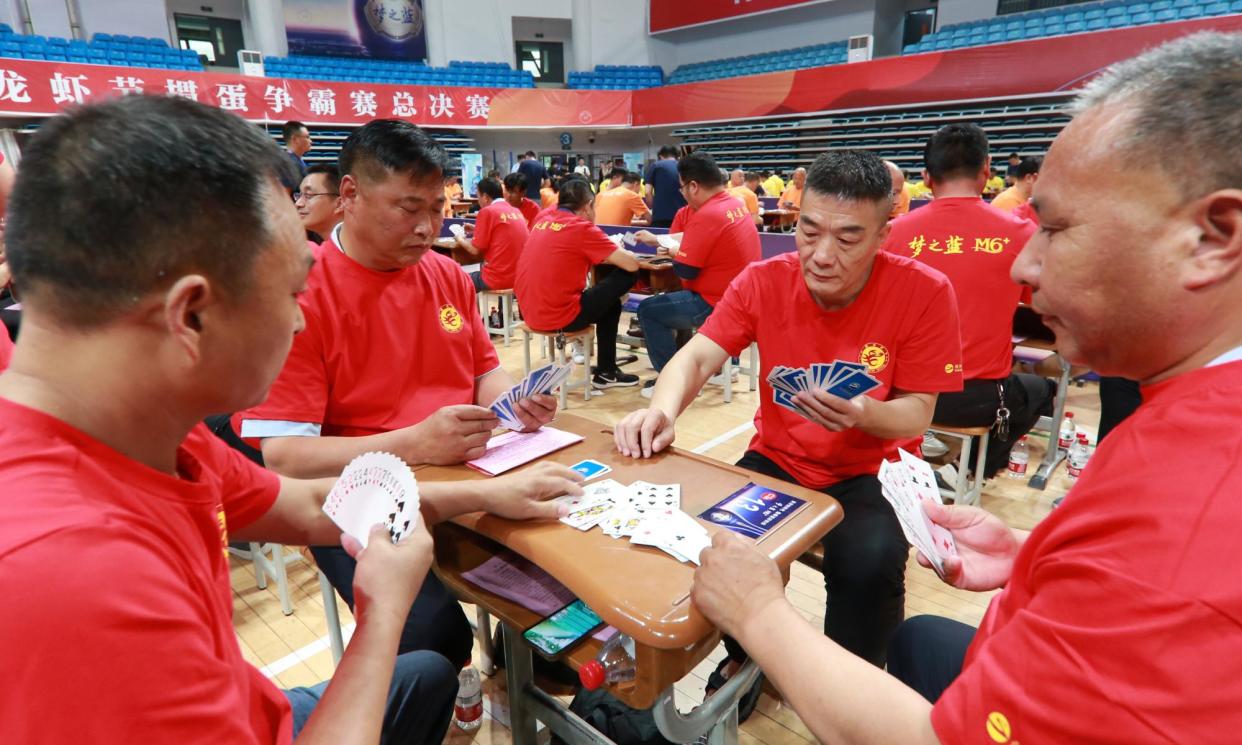‘Decadent and passive’: China cracks down on ‘throwing eggs’ card game

As recently as last year, Chinese state media was hailing guandan as the card game that “can get you a promotion in China”.
The country was holding open tournaments, and workers were encouraged to use it as a social and professional networking tool.
Guandan, or “throwing eggs”, is a four-person, two-team game of strategy. It has been around for decades, beginning in Jiangsu province, and was a favoured pastime of former leader Deng Xiaoping.
But it has had a recent resurgence, with surveys suggesting there are about 140 million enthusiasts. In 2014, the municipal government in Jiangsu tried to have it designated as “intangible cultural heritage”, and it featured in the 2023 spring festival gala – the annual lunar new year television special.
It is a popular pastime among work colleagues on their breaks and those wanting to network with officials, especially in the business sector. The game can run fast or take hours to play, providing ample opportunity for talk at the table.
One guandan instructor, Ding Hua, said: “It is … fast-paced and very adaptable to the current fast-paced life. The social significance of guandan is that it is easy to learn [and] suitable to play before a party”, making it useful for breaking the ice..”
But now it appears to have fallen out of favour with the highly interventionist ruling Communist party – being blamed for encouraging a “passive attitude” towards work, and encouraging the formation of cliques among party cadres.
A recent run of articles in the state-run Beijing Youth Daily described guandan as intoxicating and “decadent”, warning that it was “time to control the trend of ‘laying flat’ among all guandan players”. Laying flat (tangping in Chinese) is the term given to a social trend among young people who are rejecting high-pressure jobs for an easier lifestyle, which has alarmed authorities.
One recently circulated photo from a Chinese workplace revealed a “report form for personal self-examination by party members”, asking people for details on guandan players in their workplace, and any cliques that might be forming.
On Monday, a government body in Henan province published an editorial saying there was nothing wrong with playing guandan per se, but that there were unhealthy trends and a culture of cliqueyness surrounding it.
“What needs to be criticised is not the guandan game itself, but the fact that public officials use throwing eggs as a medium to form a long-term, fixed ‘guandan circle’,” it said.
“Like golf circles, food and drink circles, etc, guandan also provides a breeding ground for circle culture … If circle culture becomes popular, it will erode the cornerstone of social fairness and justice, and harm the vital interests of the general public.”
The article said curtailing the development of cliques required the strict supervision of senior figures and severe punishment of those creating “small circles” for their own “maximum interests”.
“It is easy to defeat the thief in the mountains, but it is difficult to defeat the thief in the heart,” it said.
The article said the warnings should be seen in the context of broader government efforts to reduce cliques and factions across other social sectors. China’s leader, Xi Jinping, has overseen a huge anti-corruption campaign across the Chinese Communist party, with millions of officials investigated or punished. Activities such as golf are severely frowned upon. Outside the party, authorities have targeted online fan groups, excessive gaming, and social trends that promote wealth or excess.
Wen-ti Sung, a political scientist at the Australian National University, said: “Card games as a recreational hobby is being politicised as a sign of economic unproductivity and political cronyism, which gets connected to poor performance and political corruption, which entails disobedience to leadership’s calls for more … moral purity and discipline.”
The crackdown on guandan is not proving very popular among users. The Beijing Guandan Club posted a furious defence online, asking “where this evil wind came from?”.
It said “circle culture” flourished in China no matter the sport, pointing at previous crazes among business executives and officials for badminton and golf. “According to the logic of those who criticise the game of throwing eggs, should badminton, table tennis, bridge, golf and other sports also be criticised? Should they also be banned?”
Some online comments suggested the furore over guandan may instead encourage more people to play. One wrote: “What the state resists is what the people support.”


